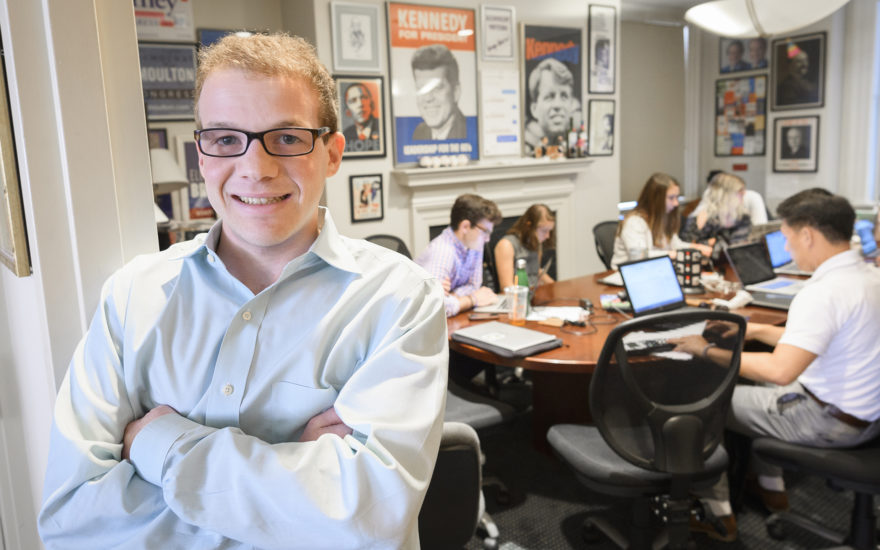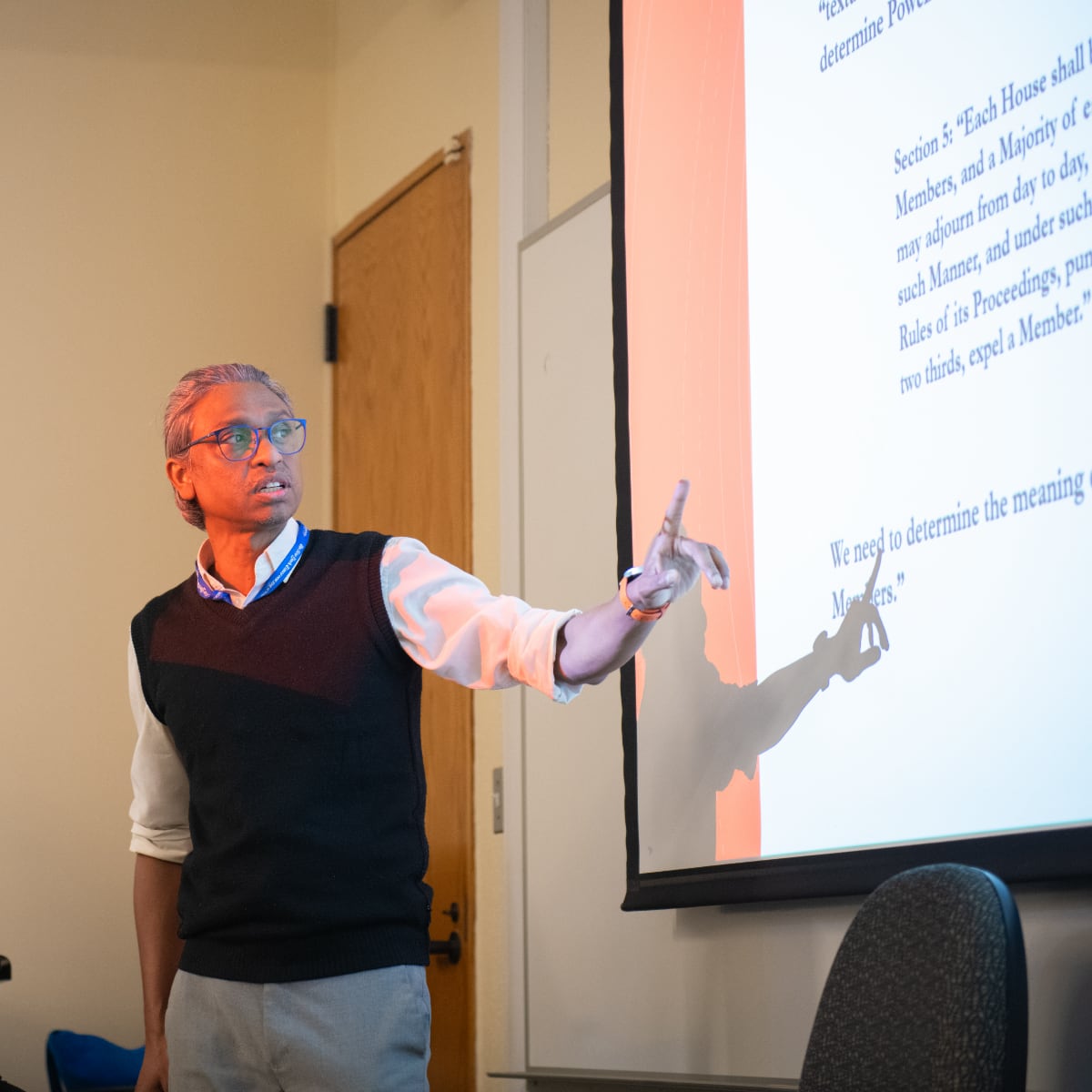Understanding the policies and decisions that shape your life on the local, national, and international level requires keen insight and expert analysis. The bachelor of arts degree in political science from Clark University helps you explore this dynamic subject across three crucial areas — American politics and public policy, comparative politics, and international relations — in the context of a foundational liberal arts education.


Why study political science at Clark?
- Engage in hands-on learning experiences like Clark’s highly successful Mock Trial team and Model United Nations program (one of the top 15 in the country), where you can compete in conferences at Yale, Harvard, Mount Holyoke, and other colleges.
- Apply to participate in a faculty-led trip to Washington, D.C., to attend oral arguments at the U.S. Supreme Court, and meet with professionals from a range of judicial agencies and Clark alumni who are lawyers.
- Apply to the department’s Harrington Public Affairs Fellowship Program, which funds several political science majors each year as they conduct original research on politics and public policy, as well as service projects.
- Apply
- Request Info
Are you ready to take the first step?
Featured Courses

Refugees, Migrants, and the Politics of Displacement
Gain an understanding of and explore solutions to the global refugee crisis. Examine the factors that cause people to flee their homelands, how they experience that displacement, and their impact on host countries.

Women and War
Women have assumed both active and passive roles in violent conflict since the beginning of time. Here you’ll examine the impact of war on women and develop a broader understanding of women’s role in society.

Middle East Politics
Explore this troubled region by examining ethnic and religious rivalries, authoritarianism and transitions to democracy, the role of oil, and the impact of nonviolent civil society and violent non-state actors.
A minimum of 13 courses are required to complete the political science major. Foundational classes in research methods and political theory will show you how to articulate, evaluate, defend, and rebut answers to the questions that political scientists ask. You’ll choose a subfield of political science (American politics and public policy, comparative politics, or international relations), taking courses from the introductory level to an advanced capstone seminar. Classes outside your subfield, as well as Economics and the World Economy and a course in history, will broaden your knowledge base. You’ll have flexibility in your course selection.
Subfields of study in the political science program
American Politics
The American Politics and Public Policy subfield includes study of basic political and governmental institutions, major political processes, and important patterns of political behavior. Subfield specialists become familiar with each of these three broad areas, learning how the political system operates, why public policy emphasizes particular values and allocates certain resources to different groups and individuals, and who benefits and who loses in policy outcomes in policy areas such as housing, the environment, and the economy. The federal structure of American government and the diversity of the American population also require familiarity with state politics, urban and suburban politics, law and politics, African-American politics, and women and politics.
Comparative Politics
Comparative politics has two intertwined meanings at Clark:
- It means immersion in the study of politics in two or more countries other than the U.S., and
- It means deliberately comparing important factors, such as elites or policy-making processes in two or more countries.
Subfield specialists are given the chance to delve into politics experienced by elites and ordinary people inside other countries. While the U.S. is intentionally kept off center stage in comparative politics courses, most of them raise specific questions about American politics—its policies, experiences, and assumptions—as they are seen from the vantage point of people in other countries. The study of comparative politics alerts the specialist to the varieties but also the surprising similarities in how power is gained, and how it is justified and wielded in different countries.
International Relations
Political Science majors who specialize in international relations address global politics at two intersecting levels:
- formal state-to-state behavior in terms of diplomacy, war and peace, intervention, law, and organization; and
- translation of global interactions in terms of trade, development, social movements, refugees, human rights, ecology, and media.
Subfield specialists engage in rigorous theoretical investigations of competing analytic traditions as they attempt to explain ongoing problems of world order. Some of these problems are local, such as boundary disputes; some are regional, such as regional economic integration; and some are global, such as poverty, the greenhouse effect, or militarization. Similarly, the actors in world politics are diverse: national governments, sub-national governments, international organizations, private interest groups, social classes, and religious movements.
Career Communities are industry-focused groups designed to support your professional exploration and narrow down your career interests within specific fields. You’ll connect to opportunities, professionals, and information that will support your career development. The following communities may be of interest:
Government, International Affairs, and Law
Non-Profit, Human Services, and Education
Qualified students can join the Clark chapter of Pi Sigma Alpha, the national political science honor society.
Law
Research Counsel National Association of Criminal Defense Lawyers; Associate Justice, Rhode Island Super Court
Politics and Government
Congressional Member’s Chief of Staff, U.S. House of Representatives; Legislative Aide, Massachusetts State House; Project Manager, Department of Housing Preservation and Development, New York, N.Y.
Nongovernmental, Nonprofit and International Affairs Organizations
Project Coordinator, United Nations Development Program; Director of Middle East and African Partnerships, Americares Foundation; Director of the Office of the President, Enroll America; Partnership Solutions Lead, Credential Engine; Associate Director for Latin America and the Caribbean, National Endowment for Democracy
Business
Senior Vice President, American Stock Exchange; Associate Manager for Government Solutions, Monster.com
Public Administration, Public Affairs and Public Policy
Policy Analyst, Economic Progress Institute
The Clark Experience
The Clark Experience brings together the exceptional education you’ll receive in the classroom and so much more. Through focus and flexibility, it ensures you’ll leave Clark with the creativity, confidence, and resilience to succeed and lead a life of meaning and consequence.
Frequently Asked Questions
What can I do with a major in political science?
At Clark you’ll get more than a great education; you’ll also be prepared for a long, productive career and life of consequence. And once you’ve completed your degree, you can join other Clark alumni who have gone on to work for great organizations and attend some of the best graduate schools in the world.
What skills will I learn?
- Conduct political science research using appropriate data and methods
- Formulate a research question and a thesis statement, and write a critical literature review
- Use evidence to articulate and defend arguments about the relative merits of political actions, policies, and types of political institutions
- Analyze and evaluate arguments and statements made by both scholars and political actors
- Communicate effectively in both written and oral form
Can a political science major earn an academic achievement award?
Morris H. Cohen Prize for Excellence in American Political and Public Policy
The Morris H. Cohen Prize was established to honor Morris H. Cohen, who joined the Government Department faculty at Clark University in 1947, and, who until his death in 1990, set the highest standards in teaching. He always had a deep concern for all facets of undergraduate learning and undergraduate education and who, after retirement in 1989, remained an active member of the Clark University community by directing the Clark Washington Semester Program at American University. The prize is given to recognize the outstanding government major at the beginning of his or her senior year.
Sallie Robinson Holthausen Prize for Excellence in International Relations
The Sallie R. Holthausen Prize was established in honor and memory of Sallie R. Holthausen, a member of the class of 1958, by her family and friends. The prize is given annually to an outstanding Political Science student for excellence in the subfield of international relations.
The Zenovia Sochor Memorial Fund
The Zenovia Sochor Memorial Fund is awarded annually by the Political Science Department to declared Political Science majors or minors studying abroad in spring, preferably in an Eastern European country. Professor Zenovia Sochor taught comparative politics courses at Clark for almost two decades. She was known by students and colleagues as a gifted scholar, a valued friend, and a caring mentor. Alumni, friends, and colleagues created the Zenovia Sochor Memorial Fund to provide support to Clark students for study abroad experiences.
Irving and Edith Wilner Prize for Best research Paper in American Politics
The Irving and Edith Wilner Prize was established by Irving Wilner, class of 1932, to award a student who has published on a topic of practical significance in the improvement of the functioning of American political institutions.
Chair’s Prize for Excellence in Comparative Politics
Annual award given to an outstanding political science student for excellence in the subfield of comparative politics.
Is there a political science honors program?
During your junior year, you might be accepted into the political science honors program. Joining the program means you’ll work closely with a professor to create a thesis on a topic of your choice. Examples of recent honors thesis topics are:
- LGBT Politics and Migration in Latin America: The Case of Argentina as a Safe Haven for Gender and Sexual Minorities
- From Trials and Truth to Amnesty and Amnesia: Transitional Justice in Argentina and Spain
- Anti-American Propaganda in Cuba: Stability through Fear
- Theravada Buddhism’s Political Significance under the Military Junta (1992-2011) and President Thein Sein’s Democratizing Government (2011-) in Myanmar
- Overriding the Tax Revolt: An Exploration of Why a Majority of the Voters in Some Massachusetts Cities and Towns Have Voted for Higher Property Taxes
Be a force for change.
Come study at a small research university with a strong liberal arts core.

